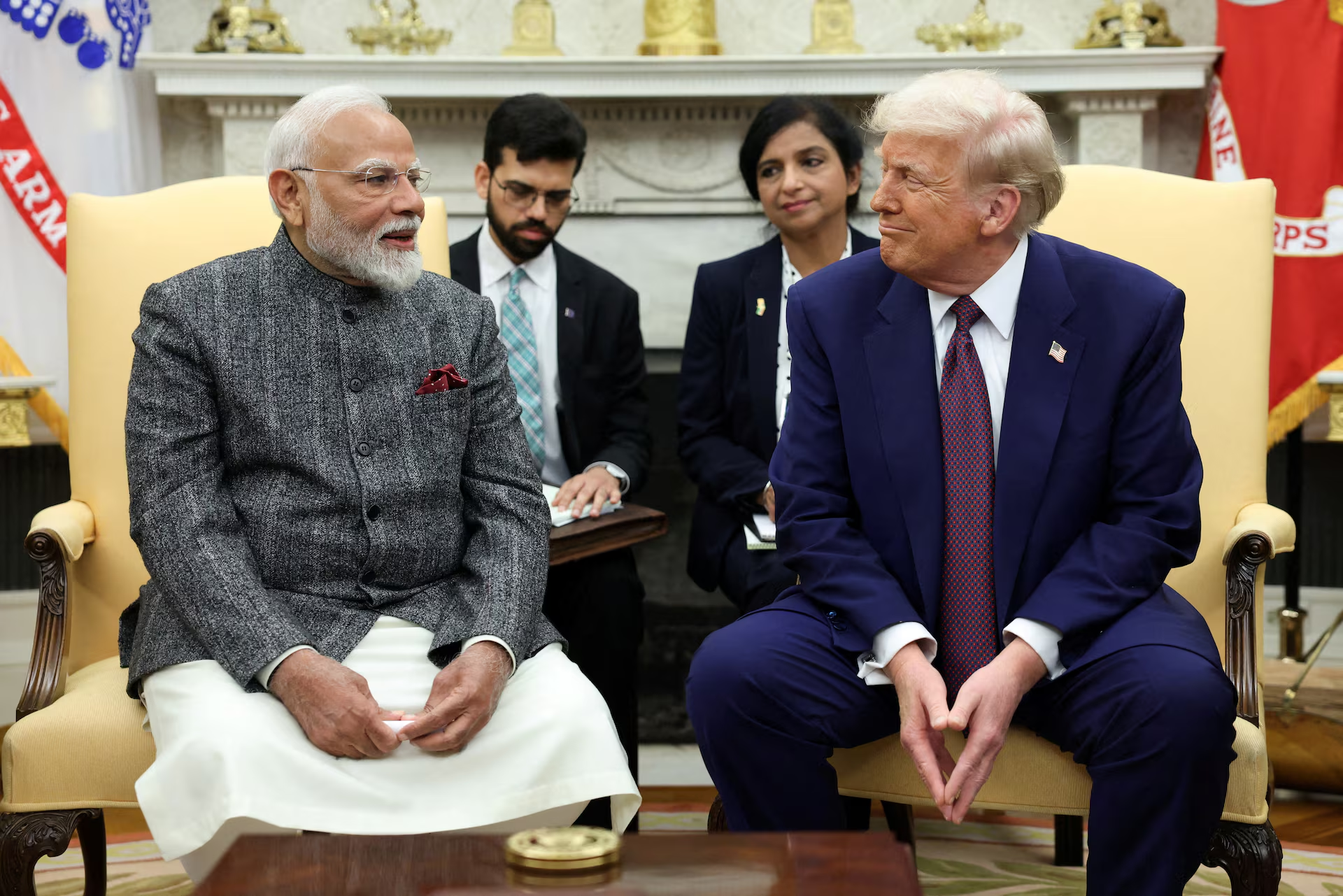
၈ ဩဂုတ် ၂၀၂၅
နယူးဒယ်လီ — သမ္မတ ထရမ့်က အိန္ဒိယကုန်ထုတ်ကုန်များအပေါ် အခွန်တိုးမြှင့်ချမှတ်သည့် ဆုံးဖြတ်ချက်အပြီးတွင် အိန္ဒိယသည် အမေရိကန်လက်နက်နှင့် လေယာဉ်များ ဝယ်ယူရေး အစီအစဉ်များ ကို ယာယီရပ်ဆိုင်းလိုက်သည်။ ဤဆောင်ရွက်ချက်သည် နှစ်ပေါင်းများစွာအတွင်း အမေရိကန်–အိန္ဒိယ ဆက်ဆံရေးကို အနိမ့်ဆုံးအဆင့်သို့ သက်ဆင်းသွားစေသည်။
◾️ ဇာတ်ရှိန်မြင့်တက်ခြင်း
အိန္ဒိယအရာရှိ သုံးဦးက အိန္ဒိယသည် Stryker တိုက်ခိုက်ရေးယာဉ်များနှင့် Javelin ဒုံးကျည်များအပါအဝင် အဓိကကာကွယ်ရေးဆိုင်ရာ သဘော တူညီချက်များကို ဆိုင်းငံ့လိုက်ကြောင်း Reuters သတင်းဌာနသို့ အတည်ပြုပြောကြားခဲ့သည် ။ အိန္ဒိယကာကွယ်ရေးဝန်ကြီး ဝါရှင်တန်သို့ သွားရောက်ရန် စီစဉ်ထားသည့် ခရီးစဉ်ကိုလည်း ဖျက်သိမ်းလိုက်သည်
◾️ဘာကြောင့်အရေးကြီးသလဲ:
ထရမ့်သည် အိန္ဒိယကုန်စည်များအပေါ် အခွန်ကို ၅၀ ရာခိုင်နှုန်းအထိ နှစ်ဆ တိုးချထားသည်။ ဒေလီ က ရုရှားရေနံဝယ်ယူခြင်းဖြင့် ယူကရိန်းစစ်ကို ငွေကြေးထောက်ပံ့နေသည်ဟု စွပ်စွဲထားသည်။ အိန္ဒိယက ထိုအခွန်ကို မမျှတသော နိုင်ငံရေးအခြေခံလုပ်ဆောင်မှုဟုမြင်နေသည်။
▪️သဘောပေါက်သင့်သည့်အချက်:
အိန္ဒိယအနေဖြင့် စာချုပ်များကို တရားဝင်ဖျက်သိမ်းခြင်းမဟုတ်ဘဲ ရွှေ့ဆိုင်းထားခြင်းဖြစ်သည်။ အရာရှိတဦးကဆိုသည်မှာ အခွန်နှင့် နှစ်နိုင်ငံဆက်ဆံရေးကိစ္စ ပိုမိုရှင်းလင်းလာသည့်အခါတွင် ယင်းတို့ကို ပြန်လည်ဆောင်ရွက်နိုင်ပါသည်ဟုပြောသည်။
◾️ မဟာဗျူဟာ အနေအထား:
အိန္ဒိယသည် မကြာသေးမီနှစ်များအတွင်းက ရုရှားလက်နက်များမှ ဖယ်ခွာ၍ အမေရိကန်နှင့် ဥရောပ နိုင်ငံများထံသို့ပြောင်းလဲချည်းကပ်ခဲ့သည်။ သို့သော် ရုရှားနှင့် စစ်ရေးဆက်နွယ်မှုသည် နှစ်ပေါင်းများစွာ ခိုင်မာနေသဖြင့် အိန္ဒိယသည် ရုရှားစနစ်များနှင့် ဆက်လက်ချိတ်ဆက်နေဆဲဖြစ်သည်။
◾️ ရုရှားရေနံကိစ္စ
အိန္ဒိယက အမေရိကန်အပါအဝင်အခြားသော နိုင်ငံများထံမှ ရေနံဈေးပိုသက်သက်သာသာနှင့်ရလျှင် ရုရှား ထံမှ ရေနံတင်ပို့မှု လျှော့ချမည်ဟုပြောသည်။
◾️ဗလောင်ဆူလာသောတင်းမာမှုများ
ထရမ့်က ၂၀၂၅ တွင် အိန္ဒိယနှင့် ပါကစ္စတန်အကြား သူသည် ငြိမ်းချမ်းရေး အကျိုးဆောင်ခဲ့သည်ဟု ပြောခဲ့သော်လည်း အိန္ဒိယကမူ ယင်းကိုပယ်ချခဲ့သည်။ ထို့အပြင် ပါကစ္စတန်တပ်ချုပ်ကို အိမ်ဖြူတော်သို့ ဖိတ်ကြားမှုကလည်း အိန္ဒိယ၏ စိတ်နာမှုကိုတိုးစေခဲ့သည်။
◾️နောက်တစ်ဆင့်
အိန္ဒိယသည် မဟာဗျူဟာလွတ်လပ်အမှီအခိုကင်းမှု၊ ပြည်သူများ၏ခံစားချက်အမြင်နှင့် ကာကွယ်ရေး လိုအပ်ချက်တို့အကြား သတိကြီးစွာထား၍ ချိန်ညှိလုပ်ဆောင်ဖွယ်ရှိနေသည်။ ထရမ့်၏ အခွန်မူဝါဒ ပြန်လည်ပြောင်းလဲနိုင်ခြေကိုလည်း စောင့်ကြည့်နေသည်။
Source : International News outlets
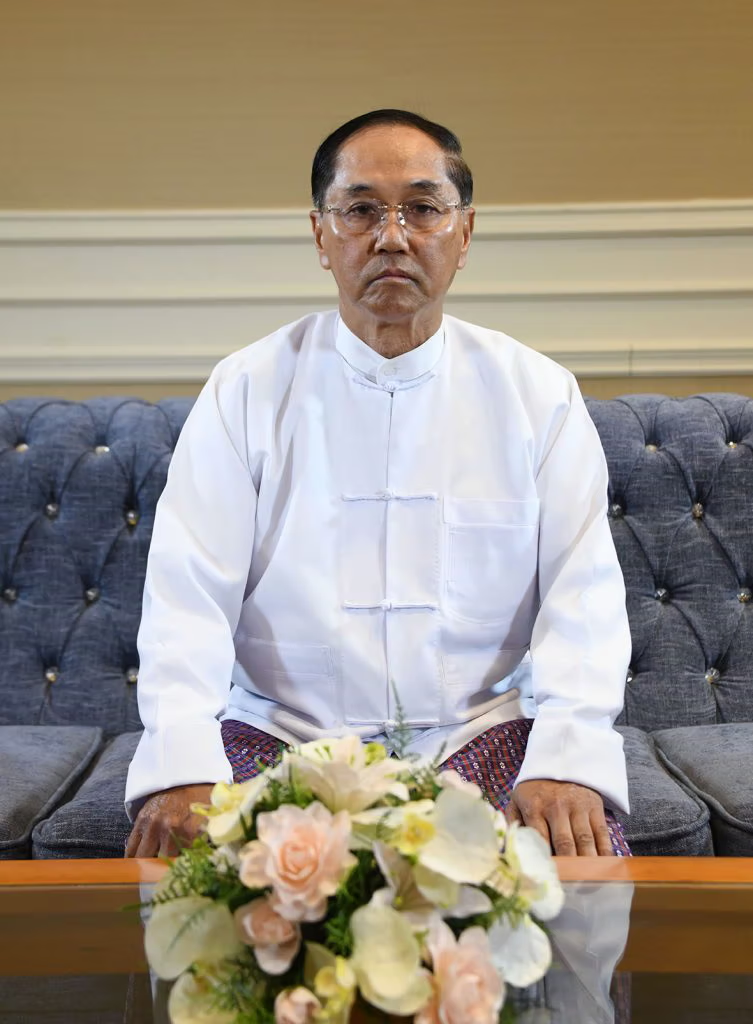
Nay Pyi Taw – August 7, 2025 — Myanmar's Pro Tempore President, U Myint Swe, passed away today, August 7, at 8:28 a.m. at the 1,000-bed No. 2 Military Hospital. He was 75 years old.
The National Defense and Security Council announced that a state funeral will be held for the pro tempore president. Additionally, a three-day national mourning period has been declared from August 7 to August 9, 2025. The national flag of the Republic of the Union of Myanmar is to be flown at half-staff during this time.
Since early 2023, U Myint Swe began experiencing sluggish movements and a weakened appetite, leading to medical examinations by a special team of senior specialists. Diagnostic tests revealed he was suffering from Parkinson's Disease and related neurological weakness. He received treatment at Singapore's Mount Elizabeth Medical Center from April 15-19, 2024, and then at the 1,000-bed No. 2 Military Hospital from May 27-June 18.
Following his discharge, a special medical team led by Union Minister of Health Professor Dr. Thet Khaing Win continued to monitor and treat him. However, his health did not improve. On July 18, 2024, he began receiving medical treatment and resting at home on sick leave.
In July24, 2025, U Myint Swe experienced weight loss, poor appetite, fever, and decreased brain activity. He was readmitted to the 1,000-bed No. 2 Military Hospital on July 24, where he remained until his death.
#ymg/ PP
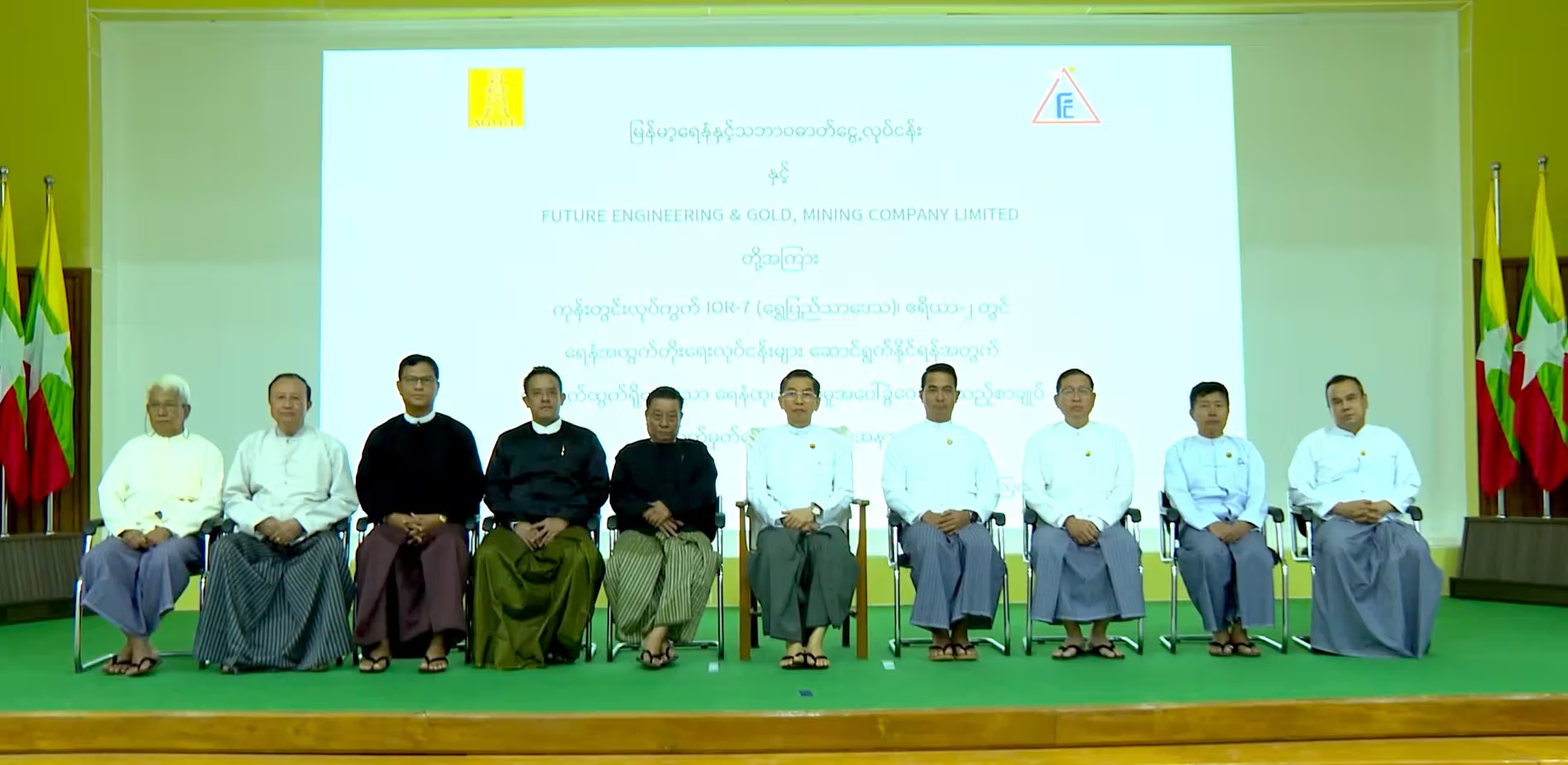
August 6, 2025,Nay Pyi Taw- Two private companies will begin exploration for oil and natural gas in three onshore blocks in the Pyae (Pyay) Sedimentary Basin region.
The two private companies, HNA Myanmar Oil & Gas Ltd and Future Engineering & Gold, Mining Co., Ltd, signed production sharing contracts with the Myanma Oil and Gas Enterprise, which is under the Ministry of Energy. The signing ceremony took place today, August 6, at the Ministry of Energy in Nay Pyi Taw.
According to a press release from the Ministry of Energy, HNA Myanmar Oil & Gas Ltd will carry out increased oil extraction operations in onshore blocks IOR-4 (Pyae region) Area-1 and IOR-6 (Myanaung region) Area-3. Meanwhile, Future Engineering & Gold, Mining Co., Ltd. will perform similar work in block IOR-7 (Shwepyithar region) Area-2.
Union Minister for Energy U Ko Ko Lwin, who presided over the contract signing ceremony, stated, "The Pyae, Myanaung, and Shwepyithar oil fields, which are located in the larger Pyae Sedimentary Basin, have a great history and good potential. We believe that if we can carry out exploration, evaluation, and drilling using modern technologies and equipment, it will be very beneficial for the state and will be successful."
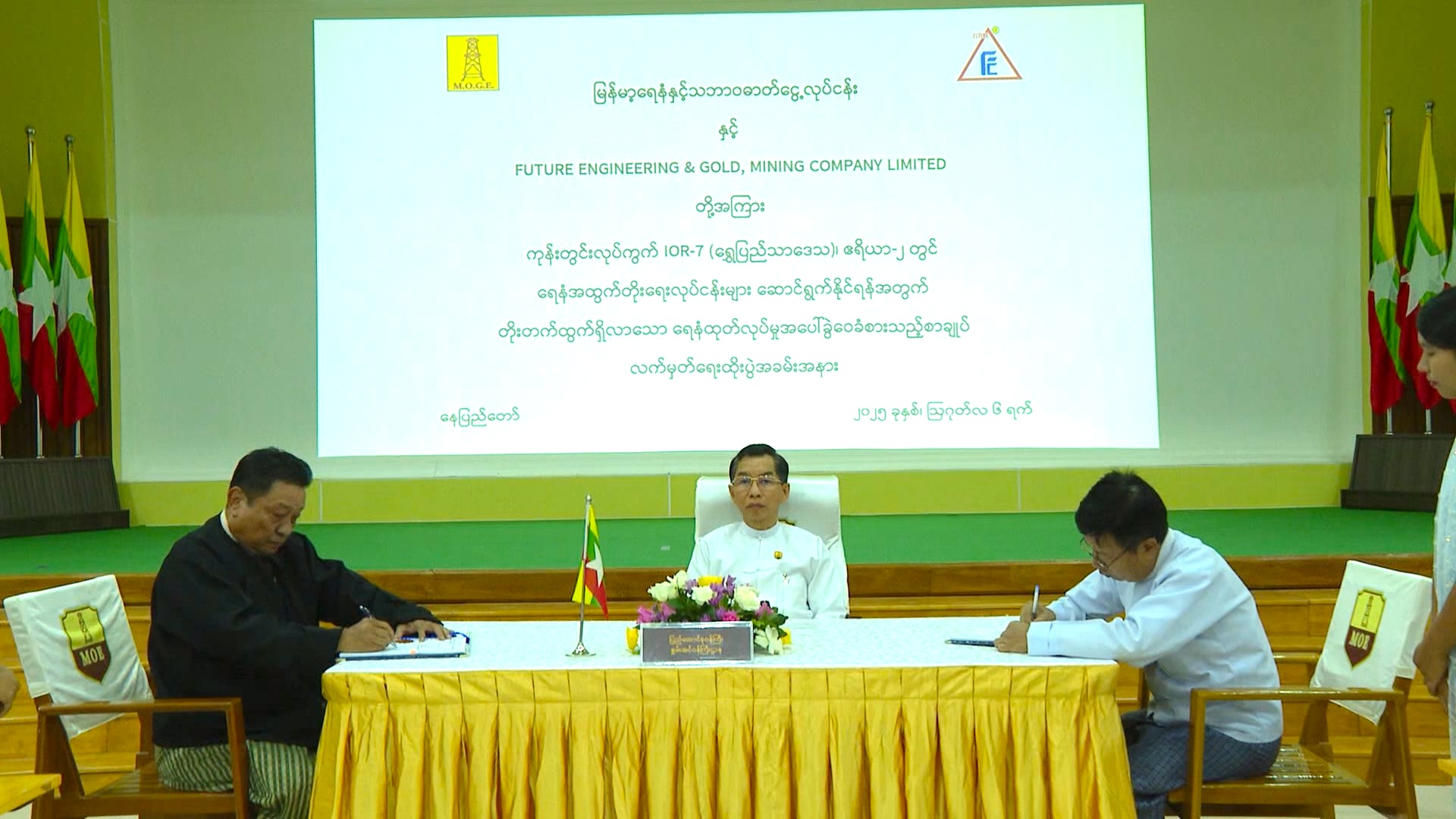
Officials from the private companies and senior officials from the Ministry of Energy also attended the signing ceremony.
The Ministry of Energy has been allowing Local entrepreneurs to operate 10 onshore blocks in mature oil fields under a production sharing contract system. According to the Ministry's press release, the first block approved in October 2024 is already producing natural gas, which is being used to provide electricity to that region.
#ymg/knl
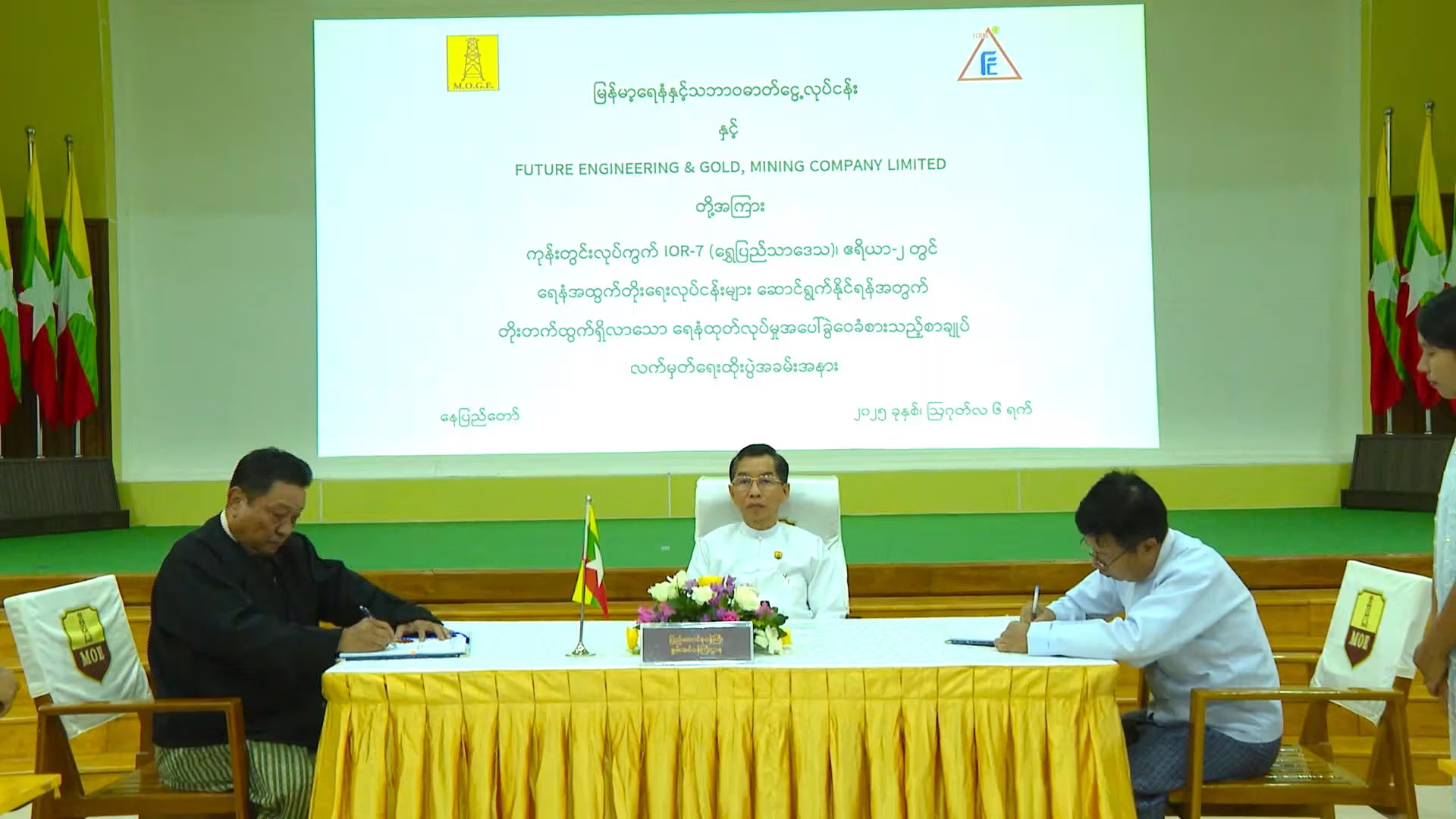
၆ ဩဂုတ် ၂၀၂၅
ကုန်းတွင်းလုပ်ကွက်တွေဖြစ်တဲ့ “ပြည်” အနည်ကျချိုင့်ဝှမ်းကြီး ဒေသ(၃)ခုတွင် ရေနံနှင့် သဘာဝဓာတ်ငွေ့များထုတ်လုပ်နိုင်ရန် ပုဂ္ဂလိက ကုမ္ပဏီ(၂)ခုက စတင်ဆောင်ရွက်တော့မယ်လို့သိရ ပါတယ်။
အဆိုပါ ပုဂ္ဂလိက ကုမ္ပဏီ (၂)ခုကတော့ HNA Myanmar Oil & Gas Ltd နှင့် Future Engineering & Gold, Mining Co., ltd တို့ဖြစ်ကြပြီး စွမ်းအင်ဝန်ကြီးဌာနလက်အောက်ရှိ မြန်မာ့ရေနံနှင့်သဘာဝ ဓာတ်ငွေ့လုပ်ငန်းနှင့် ယင်းကုမ္ပဏီများ ဩဂုတ် ၆ ရက်က နေပြည်တော်ရှိ စွမ်းအင်ဝန်ကြီးဌာနတွင် စာချုပ်များလက်မှတ်ရေးထိုးချုပ်ဆိုခဲ့ကြပါတယ်။
HNA Myanmar Oil & Gas Ltd ကုမ္ပဏီသည် ကုန်းတွင်းလုပ်ကွက် IOR-4 (ပြည်ဒေသ) ဧရိယာ - ၁ နှင့် IOR-6 (မြန်အောင်ဒေသ) ဧရိယာ - ၃ တို့တွင်လည်း ကောင်း၊Future Engineering & Gold, Mining Co., ltd. သည် IOR-7 (ရွှေပြည်သာဒေသ) ဧရိယာ - ၂ တွင်လည်းကောင်း ရေနံ အထွက်တိုးရေးလုပ်ငန်းများဆောင်ရွက်နိုင်ရန်အတွက် တိုးတက်ထွက်ရှိလာသော ရေနံနှင့် သဘာဝ ဓာတ်ငွေ့ထုတ်လုပ်မှုအပေါ် ခွဲဝေခံစားသည့်စာချုပ်များ လက်မှတ်ရေးထိုးခဲ့ကြတာဖြစ်ကြောင်း စွမ်း အင်ဝန်ကြီးဌာနရဲ့သတင်းထုတ်ပြန်ချက်မှာဖော်ပြထားပါတယ်။
“ယနေ့စာချုပ်ချုပ်ဆိုမည့် ပြည်ရေနံမြေ၊ မြန်အောင်ရေနံမြေနှင့် ရွှေပြည်သာရေနံမြေ တို့သည် ပြည်အနည်ကျချိုင့်ဝှမ်းကြီးအတွင်း တည်ရှိသည်ဖြစ်ရာ အစဉ်အလာကောင်းများနှင့် အလား အလာ ကောင်းများရှိသည့် ရေနံမြေများဖြစ်သဖြင့် ခေတ်မီနည်းပညာများ၊ ခေတ်မီစက်ကိရိယာများ အသုံး ပြု၍ ရှာဖွေခြင်း၊ အကဲဖြတ်ခြင်း၊ တူးဖော်ခြင်းတို့ကို ဆောင်ရွက်နိုင်မည်ဆိုပါက နိုင်ငံတော် အတွက် များစွာအထောက်အကူပြုမည်ဖြစ်ပြီး အောင်မြင်မည်ဟုလည်းယုံကြည်တယ်”လို့ အဆိုပါ စာချုပ်ချုပ် ဆိုပွဲကို ဦးဆောင်တက်ရောက်တဲ့ စွမ်းအင်ဝန်ကြီးဌာန ပြည်ထောင်စုဝန်ကြီး ဦးကိုကိုလွင်က အခမ်း အနားမှာပြောကြားခဲ့ပါတယ်။
စာချုပ်ချုပ်ဆိုပွဲတွင် စွမ်းအင်ဝန်ကြီးဌာနပြည်ထောင်စုဝန်ကြီးနှင့်အတူ အဆိုပါပုဂ္ဂလိကုမ္ပဏီ များမှ တာဝန်ရှိသူတွေ၊ စွမ်းအင်ဝန်ကြီးဌာန ဌာနဆိုင်ရာ အကြီးအကဲတွေ တက်ရောက်ခဲ့ကြပါတယ်။
စွမ်းအင်ဝန်ကြီးဌာနသည် သက်တမ်းရင့်ရေနံမြေများမှ ကုန်းတွင်းလုပ်ကွက်(၁၀)ကွက်ကို တိုင်းရင်းသားလုပ်ငန်းရှင်များနှင့် ပူးပေါင်း၍ တိုးတက်ထွက်ရှိလာသော ရေနံနှင့် သဘာဝ ဓာတ်ငွေ့ ထုတ်လုပ်မှုအပေါ် ခွဲဝေခံစားသည့်စာချုပ်ဖြင့် လုပ်ငန်းများဆောင်ရွက်ခွင့်ပြုပေးလျက်ရှိတယ်လို့ လည်း သိရပါတယ်။
၂၀၂၄ ခုနှစ် အောက်တိုဘာလတွင် ပထမအကြိမ်ခွင့်ပြုပေးခဲ့သည့် လုပ်ကွက်အနေဖြင့် ယခုအချိန်တွင် သဘာဝ ဓာတ်ငွေ့များထုတ်လုပ်နေပြီး ယင်းဒေသ၏ လျှပ်စစ်မီးရရှိရေးအတွက် အသုံးပြုလျက်ရှိနေပြီဖြစ်တယ်လို့လည်း စွမ်းအင်ဝန်ကြီးဌာနရဲ့ သတင်းထုတ်ပြန်ချက်မှာ ဖော်ပြထားပါတယ်။
#ymg/knl
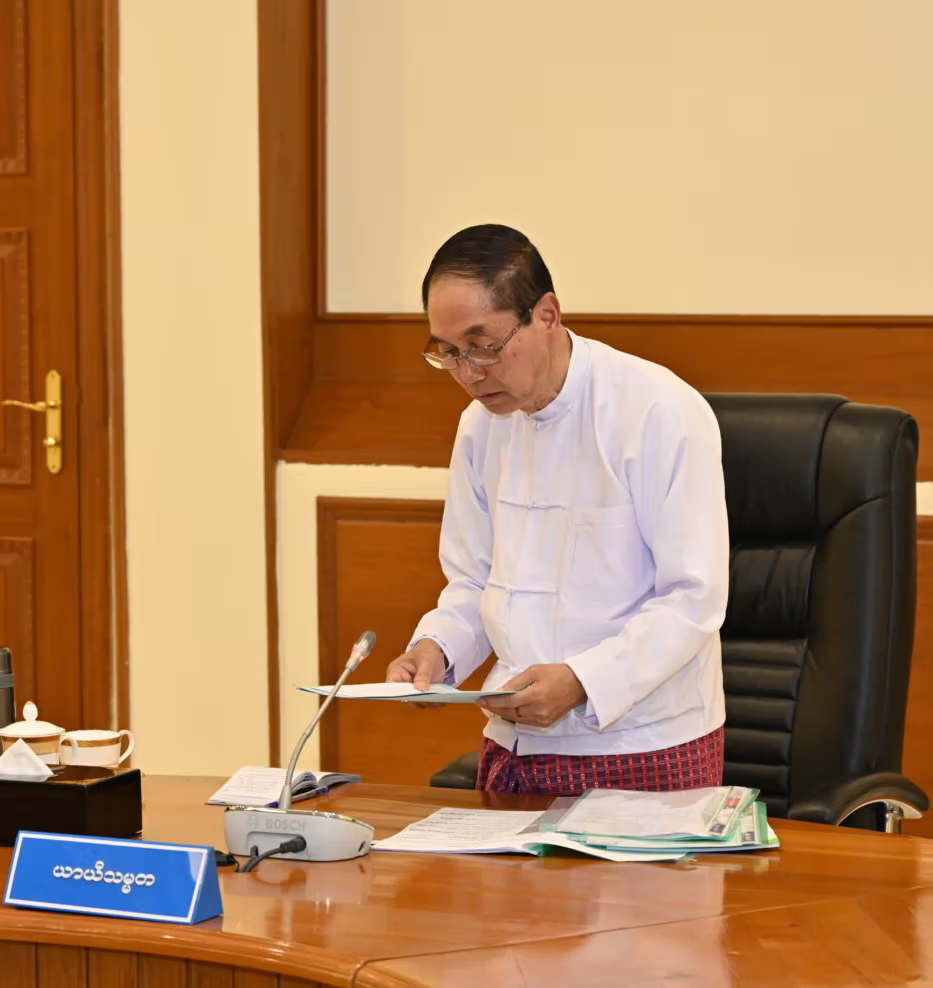
YANGON, Myanmar, August 5, 2025- The National Defence and Security Council announced that Pro Tem President U Myint Swe's health is in a concerning state, and he is receiving treatment in the intensive care unit.
According to the statement, Pro Tem President U Myint Swe was readmitted to the 1,000-bed Military Hospital No. 2 on July 24, 2025, due to a decline in his health, including weight loss, loss of appetite, fever, and reduced alertness, which occurred in July.
The Pro Tem President has previously received medical treatment for Parkinson's disease and related neurological disorders. He was treated at Mount Elizabeth Medical Center in Singapore from April 15 to 19, 2024, and then at the 1,000-bed Military Hospital No. 2 from May 27 to June 18, 2024.
After his discharge, a special medical team led by Union Minister of Health Professor Dr. Thet Khaing Win continued to monitor and treat U Myint Swe.
However, as his condition did not improve, he was granted medical leave to rest and receive treatment at home starting from July 18, 2024. His health subsequently deteriorated, necessitating his return to the hospital.
Due to Pro Tem President Myint Swe's health-related leave from the National Defence and Security Council, Commander-in-Chief of Defence Services Senior General Min Aung Hlaing has been serving as the Pro Tem President (On Duty) on the council.
#ymg/knl

၅ ဩဂုတ် ၂၀၂၅
ယာယီသမ္မတ ဦးမြင့်ဆွေ၏ ကျန်းမာရေးအခြေအနေစိုးရိမ်နေရပြီး အထူးကြပ်မတ်ကုသဆောင်တွင် ကုသခံယူနေရတယ်လို့ အမျိုးသားကာကွယ်ရေးနှင့်လုံခြုံရေူကောင်စီက သတင်းထုတ်ပြန်ပါတယ်။
ယာယီသမ္မတဦးမြင့်ဆွေသည် ၂၀၂၅ ခုနှစ်၊ ဇူလိုင်လအတွင်း ကိုယ်အလေးချိန်လျော့ကျခြင်း၊ အစာ ကောင်းစွာ မစားနိုင်ခြင်း၊ အဖျားတက်ခြင်း၊ ဦးနှောက်နိုးကြားမှုလျော့နည်းလာခြင်းတို့ကြောင့် ဇူလိုင်လ ၂၄ ရက်နေ့တွင် အမှတ် (၂)တပ်မတော်ဆေးရုံကြီး ခုတင်(၁၀၀၀) ၌ ထပ်မံဆေးရုံတက်ရောက် ကုသမှု ခံယူခဲ့ရတာဖြစ်တယ်လို့ သတင်းထုတ်ပြန်ချက်မှာ ဖော်ပြထားပါတယ်။
ယာယီသမ္မတသည် အာရုံကြောများ နှေးကွေးတုန့်ဆိုင်း သည့်ရောဂါ (Parkinson's Disease) ၊၎င်းနှင့် ဆက်စပ်ဖြစ်ပေါ်သော အာရုံကြောအားနည်းရောဂါများကြောင့် ၂၀၂၄ ခုနှစ်၊ ဧပြီလ ၁၅ ရက်မှ ၁၉ ရက်အထိ စင်ကာပူနိုင်ငံMount Elizabeth Medical Center တွင် လည်းကောင်း၊ မေလ ၂၇ ရက်နေ့မှ ဇွန်လ၁၈ ရက်နေ့အထိအမှတ်(၂) တပ်မတော်ဆေးရုံကြီးခုတင် (၁၀၀၀) တွင် လည်းကောင်း
ဆေးကုသမှုများခံယူခဲ့ရပါတယ်။
ဆေးရုံဆင်းပြီးနောက် ယာယီသမ္မတ ဦးမြင့်ဆွေအား ကျန်းမာရေးဝန်ကြီးဌာနပြည်ထောင်စုဝန်ကြီး ပါမောက္ခ ဒေါက်တာ သက်ခိုင်ဝင်း ဦးဆောင်သော အထူးဆေးကုသမှုအဖွဲ့ဖြင့်ကျန်းမာရေးစစ်ဆေးကုသ မှုများ ဆက်လက်ပြုလုပ်ခဲ့ပါတယ်။
သို့သော်သူ၏ကျန်းမာရေးအခြေအနေမှာ တိုးတက်ကောင်းမွန်လာခြင်းမရှိသည့်အတွက် ၂၀၂၄ ခုနှစ်၊ ဇူလိုင်လ ၁၈ ရက်နေ့မှ စတင်၍ နေအိမ်၌ပင်ဆေးခွင့်ဖြင့်အနားယူ၍ ဆေးကုသမှု ဆက်လက်ခံယူ နေခဲ့ စဉ် ကျန်းမာရေးအခြေအနေဆိုးရွားလာသဖြင့် ဆေးရုံပြန်လည်တက်ခဲ့ရခြင်းဖြစ်ကြောင်းသိရပါတယ်။
ယာယီသမ္မတဦးမြင့်ဆွေသည်ကျန်းမာရေးအခြေအနေကြောင့် အမျိုးသားကာကွယ်ရေးနှင့်လုံခြုံရေး ကောင်စီတွင် ခွင့်တင်ထားသဖြင့် တပ်မတော်ကာကွယ်ရေးဦးစီးချုပ် ဗိုလ်ချုပ်မှူးကြီး မင်းအောင်လှိုင်က ယာယီသမ္မတ(တာဝန်)ဖြင့် အဆိုပါကောင်စီတွင် တာဝန်ထမ်းဆောင်နေရတာဖြစ်ပါတယ်။
#ymg/knl

၄ ဩဂုတ် ၂၀၂၅
တောင်ငူဘူတာရုံကို ခေတ်မီဘူတာရုံတစ်ခုအဖြစ် အသစ်တည်ဆောက်ရန် စီစဉ်နေကြောင်း သိရပါ တယ်။
အဆိုပါဘူတာရုံအသစ်နှင့်ဆက်စပ်ပြီး တောင်ငူမြို့ရှောင် ရထားလမ်းကိုလည်း ဖောက်လုပ်နေပါတယ်။
အဆိုပါဆောင်ရွက်ချက်များကို လအက နိုင်ငံတော်လုံခြုံရေးနှင့်အေးချမ်းသယာယာရေးကော်မရှင် (လအက) ဥက္ကဋ္ဌ ဗိုလ်ချုပ်မှူးကြီး မင်းအောင်လှိုင်ဟာ ဩဂုတ် ၂ ရက်နေ့က သွားရောက်စစ်ဆေးကြည့်ရှု ခဲ့ပါတယ်။
ပို့ဆောင်ရေးနှင့်ဆက်သွယ်ရေးဝန်ကြီးဌာန ပြည်ထောင်စုဝန်ကြီးက တောင်ငူမြို့ရှောင် ရထားလမ်း ဖောက်လုပ်ခြင်းလုပ်ငန်းဆောင်ရွက်နေမှုအခြေအနေများနှင့်ပတ်သက်၍ ရထားလမ်းအူကြောင်းနှင့် ရထားလမ်းဆိုင်ရာအချက်အလက်များ၊ တောင်ငူဘူတာရုံအသစ် တည်ဆောက်ရေး လျာထား ဆောင်ရွက် ထားရှိမှု၊ ရထားလမ်းနှင့် ဘူတာအဝင်ကားလမ်းနယ်နိမိတ်သတ်မှတ်မှု၊ဖို့မြေလုပ်ငန်းဆောင်ရွက် သွား မည့်အစီအမံများနှင့် လုပ်ငန်းဆောင်ရွက်ပြီးစီးမှုအခြေအနေများကို ရှင်းလင်းတင်ပြခဲ့ပါတယ်။
ရှင်းလင်းတင်ပြမှုများအပေါ် လအကဥက္ကဋ္ဌဗိုလ်ချုပ်မှူးကြီးမင်းအောင်လှိုင်က ရထားလမ်း နှင့် ဘူတာရုံ အသစ် တည်ဆောက်ရာတွင် ရေရှည်တည်တံ့ကောင်းမွန်စေရေး သတ်မှတ်စံချိန်စံညွှန်းများအတိုင်း လုပ်ငန်းစဉ်အဆင့်အလိုက် အရည်အသွေး ပြည့်မီအောင် တည်ဆောက်သွားဖို့ မှာကြားခဲ့ကြောင်း သိရပါတယ်။
#ymng/knl
Page 15 of 252